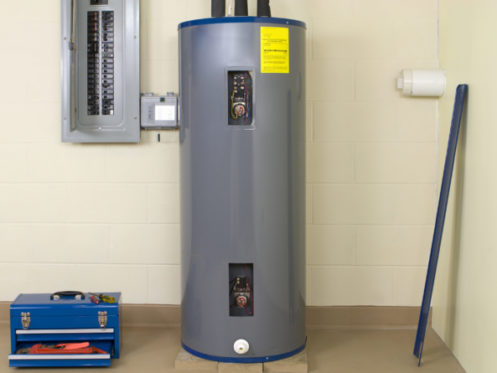When you need a new water heater, you’ll find that there are numerous options on the market. First, you’ll need to decide between gas water heaters vs electric water heaters, but how can you choose the best one for your home? This article will offer a detailed comparison of gas vs. electric water heaters. We’ll look into the advantages and disadvantages of each kind of water heater as well as the distinctions between them so that you can select the best system for your needs.
Gas Water Heaters
Gas water heaters heat water with gas. Natural gas is the most often utilized form of gas, but propane and LPG are other alternatives. Gas water heating systems usually contain a storage tank that retains a predetermined volume of hot water that is heated as required. A pilot light serves to light the burner. The water inside the tank is heated to the required temperature once the burner is ignited, and it is then kept at that temperature until it is needed.
The advantages of gas water heaters include:
- Lower operating costs
- Faster water heating
- Heated water during power outages
The disadvantages include:
- Requires more maintenance
- Less efficient because of heat loss
- Releases carbon monoxide, so ventilation is required
Electric Water Heaters
Electric water heaters employ a heating element to initiate the convection process rather than a gas burner. They are usually equipped with an electric coil that warms the water as it runs through them. Electric heaters come in two varieties: tank-type and tankless.
Tank-style electric water heaters hold hot water in a tank and dispense it as required. The downside of this type of hot water system is that the tank is rather large and can be difficult to install in zones with limited space.
On the contrary, tankless electric heating systems do not store heated water and instead heat and supply hot water as desired.
Advantages of electric water heaters include:
- Less energy Loss
- Cheaper upfront costs
- Safer than gas hot water systems
Disadvantages include:
- Slower heating time
- Requires reliable electricity
Sizes Available
Electric and gas water heaters come in various sizes to accommodate the demands of various families. Gas water heaters are often bigger than electric water heaters, so if you’ve got a large household or a high need for heated water, a gas type may be a better choice.
Gas water heaters are available in sizes ranging from 20 to 100 gallons. On the other hand, electric water heaters are normally available in capacities ranging from 6 to 50 gallons. Nevertheless, some bigger electric units may carry up to 80 gallons.
Installation
Gas water heater replacements and installations are often more complicated than electric water heater replacements and installations. This is due to the fact that, in addition to linking the heater to the plumbing in your home, you will also have to attach it to a gas connection. This implies that installing a gas hot water system is often costlier and takes more skills than installing an electric water heater.
On the contrary, electric water heaters are quite simple to install. Most of the time, all you have to do is wire the hot water system to your home’s electricity supply and then to the piping. This makes electrical water heaters viable for homeowners looking to save money on installation.
Energy Efficiency
For the ecosystem and your budget, a water heater’s energy efficiency is a crucial factor. Electric water heaters don’t need to vent combustion gases since they have a modest heating rate. Since all the energy is utilized to heat the water, an electric water heater will have a lower overall heat loss. Whereas in gas water heaters, energy is lost through the gas output. Specifically, gas water heaters have a maximum efficiency of 80-85%, whereas electric water heaters operate at 98% or more.
Heating Rate
An important factor to take into account is how quickly a water heater warms the water, particularly if you’ve got a big household or a high need for hot water. In general, gas water heaters heat water more quickly than electric ones. This is because a gas water heater’s burners can generate more heat than an electric unit’s heating elements.
The time it takes a hot water system to heat a specific volume of water is known as the recovery time. Compared to electric ones, gas water heaters often have faster recovery times. As a result, they may heat water more quickly after it has been used.
Ownership Cost
The initial cost of a water heater is simply one component of its overall cost of ownership. Over the course of the unit’s lifespan, you must also account for the expenses associated with installation, usage, and maintenance.
Gas water heaters often cost more upfront than electric units. This is due to the fact that they need a gas pipeline hookup, which might raise the installation costs. In contrast, installing an electric water heater is typically less expensive because it simply has to be connected to your property’s electrical system.
Regarding operational expenses, electric water heating systems are often more expensive to run than gas water heaters. Because natural gas is often cheaper than electricity in most states, using gas to heat water is less expensive. However, take into account the fluctuating gas costs. Gas prices are expected to skyrocket in the coming years.
Maintenance
Both electric and gas water heaters require routine maintenance and care. However, due to the hazards involved with gas leaks, gas water heaters may necessitate additional attention. To keep your water heater running effectively and safely, follow the manufacturer’s instructions for maintenance and care.
Safety
Electric water heating systems have a few benefits over gas water heaters in terms of safety. For starters, there is no danger of gas leakage. Secondly, there is a lower risk of fires with electric water heaters. However, it is important to note that an electrical fire is still possible. Always adhere to the manufacturer’s safety recommendations, and have a certified technician test your electrical water heater on a regular basis.
Both electric water heaters and gas water heaters share a few safety measures. Among them are pressure and temperature relief valves, which are made to let out too much pressure and stop explosions. Both kinds of water heaters have an auto shut-off system that activates if the water heater begins to overheat.
Lifespan
A tank gas heater has an 8- to 12-year lifetime on average. Electric water heaters without tanks often have a lifetime of 15 to 20 years. However, how long your water heater lasts depends on how well you look after it.
It’s critical to adhere to the maintenance and care guidelines provided by the manufacturer if you want your water heater to last as long as possible. This involves routinely descaling, cleaning the tank to reduce silt accumulation, and checking the anode rod for damage.
Contact Us Today
Water heaters serve a significant role in the daily routine you follow. Before selecting and installing an electric or gas water heater, there are several factors to consider. The best option for you will ultimately rely on your unique demands and budget. The highly experienced team BWS Plumbing, Heating & Air Conditioning in Eden Prairie, MN, can help you select a system for your home. We offer heating and cooling repair, maintenance, and installation services as well as handle a wide range of everyday plumbing problems, such as leaks, garbage disposal needs, drain repair, and much more. Dedicated to customer satisfaction, we offer a 100% respect guarantee and won’t leave your home a mess when we’re done with the job.
Ready to choose a water heater? Contact us today to speak to a member of our team regarding the differences between gas water heaters vs electric water heaters.
End Of Article


